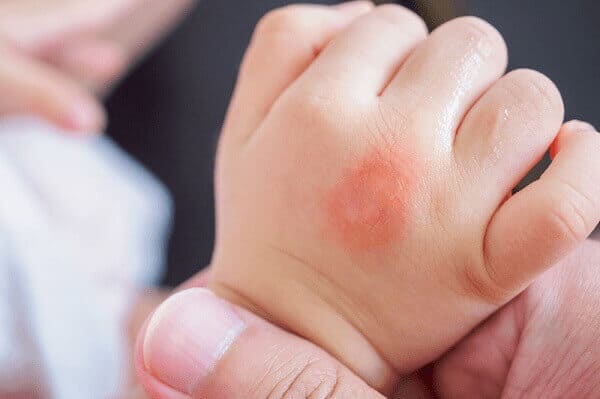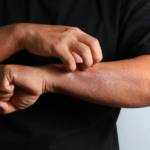You may be one of the many mothers or fathers who are trying to find out how their toddlers with eczema could get a good night’s sleep. Well, you came to the right place. Why is your toddler with eczema not sleeping through the night, and what are some solutions?
Studies found out that 41% of toddlers with eczema are not sleeping well because of the itchy, scaly rashes, as well as total discomfort that keeps them awake. Also called atopic dermatitis or infantile eczema, eczema can be irritating and painful, causing your toddler to have sleepless nights.
Researchers also concluded that even when the eczema is inactive, children with this skin condition still sleep poorly, more so when eczema flare-ups occur. [1]
According to the National Eczema Association, “83% of kids with eczema flare-ups have difficulty sleeping and staying asleep.” Furthermore, they discovered that 10% to 20% of kids have eczema. [2]
Read on to learn more about why your toddler with eczema is not sleeping and what are some ways to help them sleep soundly through the night.
Why Is a Toddler with Eczema Not Sleeping at Night?
First, you have to know all the reasons why your toddler cannot sleep well at night. Aside from the itchiness that eczema causes, there are still other factors that contribute to their lack of sleep, such as discomfort and pain.
Discomfort can cause sleepless nights, as there would be no position that your child with eczema can be comfortable in. Subsequently, due to itchiness, your toddler’s skin can acquire painful blisters and scratches that can cause pain. These add to their discomfort, aggravating their inability to sleep or to maintain their sleep.
As a result of these sleep disturbances, they would be irritable and have a short attention span during the day. Lack of sleep can affect your toddler’s cognitive processes as well. They will have problems focusing on tasks and will find it harder to work with other kids. They could also be irritable and display mood swings.
Causes of Toddler Eczema
The exact cause of eczema is still not fully known. Nevertheless, eczema in children can be associated with various factors that include the following:
- Atopic Dermatitis – This is a form of allergy in which an individual develops hypersensitivity to allergens causing eczema (dermatitis), rhinitis, or asthma.
- Allergies – Most toddlers are allergic to many environmental materials, such as dust, pollen, dirt, and other allergens. These allergens can trigger eczema flare-ups. Observing your toddler, and listing down their allergens would help you contain their eczema.
- Excessive Heat – Excessive high temperatures can also elicit the symptoms of eczema. Coupled with sweating, which can worsen your child’s eczema.
- Emotional Stress – Stress can cause eczema breakouts. This is because the immune system is closely related to hypersensitivity reactions. You can prevent this from occurring by providing a loving and caring environment for your toddler.
- Genes – Studies have shown that children with parents who have had a history of eczema increase their probability of acquiring skin disease too. Your family history is one factor in determining if your toddler’s symptoms are that of eczema.
How to Help Your Toddler with Eczema to Sleep Through the Night
I could just imagine how stressful it must be – not only for your toddler – but for you as well when your child can’t sleep properly because of eczema. When your child can’t sleep well, you’re also unable to do so.
To help you in reducing these eczema attacks, here are specific steps that you can take:
1. Bathe Your Toddler Daily
This is one effective prevention technique that improves the quality of sleep for your toddler with eczema who doesn’t sleep well at night. Bathing them daily would reduce the heat in their body and significantly eliminate microorganisms on the skin.
Bacteria can aggravate their eczema as it can cause skin infections and injury. When your toddler bathes, they will be less irritable as they would be comfortable and clean.
Make sure to trim their fingernails whenever necessary to prevent injury when they scratch their skin. To ensure this won’t happen, follow step #3.
2. Use Loose Clothing for Your Toddler
Tight clothing would constrict your child’s movements and cause discomfort. Use loose clothing, so they can move freely and would not feel uncomfortable. The more comfortable they are, the less likely their eczema would breakout. Keep in mind that stress can be a trigger for this skin condition.
3. Use Protective Gear for Your Toddler
In addition, you can use protective gear for your baby’s comfort. When you’re outdoors, avoid direct exposure to sunlight. Use baby carriages with overhead covers, and let them wear protective clothing. Likewise, use hand mittens to cover their fingernails and protect their skin when they scratch.
4. Avoid High Temperatures
Sweating can induce the symptoms of eczema, so avoid exposing your baby to high temperatures as this will cause sweating and discomfort. Avoid hot water baths as the effect would be the same. Use lukewarm water instead. Dip your elbow in the water to test if it is too hot.
Moreover, sweat can provide an ideal environment for bacterial growth. This is because sweat provides dampness and body warmth.
5. Avoid Excessive Skin Scrubbing
Use lukewarm water and mild, unscented soaps for bathing your child. Allergens can come from these scented soaps. Use an ultra-soft material to scrub gently your child’s skin to remove dirt.
Dirty skin will cause additional irritation to your toddler, but excessive cleansing can cause injury too.
A toddler’s skin is thinner and thus more sensitive than an adult’s skin. What can be soft for you may not be soft for them, so be extra careful.
6. Hydrate Adequately
You have to hydrate them adequately by giving them ample water and liquids. This will provide sufficient water for their skin to stay moist. Additionally, water intake will help flush out impurities or destructive allergens from your child’s body. It would nourish body cells, so they could perform their physiologic functions effectively.
7. Avoid Exposing Your Toddler to Possible Allergens
To prevent your toddler from getting eczema, you must avoid exposing them to possible triggers, such as dust, harsh soaps, harsh shampoos, animal hair, coarse materials, molds, harsh lotions, and some foods.
A number of children have an allergy to dairy products, such as milk and butter. Eggs, shellfish, soy, and tree nuts are also common allergens.
You will have to observe what food your toddler is allergic to. Allergies can be inherited, so find out your family history about allergies. Include your spouse in your research. Most likely, your allergies are the same as your kid’s.
How Will You Know That Your Toddler Has Eczema?

Children can have varied eczema symptoms, depending on their immune system, genes, and environmental factors. You can detect if your toddler has infantile eczema by observing their skin. Search for symptoms on his skin, such as:
- Scaly, dry skin
- Itchiness
- Redness
- Small bumps usually starting on the cheeks and forehead
These symptoms may spread to different parts of their body when flare-ups or breakouts occur. But don’t worry, eczema is not infectious. This means that children who don’t have it cannot get infected.
Recommendations from Health Experts
The American Academy of Dermatology recommends bleach baths in treating eczema. However, it is important to add too much bleach to the water (water must not be too hot or too cold) because it would irritate the child’s skin. Too little bleach won’t have any effect, though.
Don’t apply the bleach directly to your toddler’s skin or add other substances, as this can damage his skin. The proportion of water and bleach must be exact. [3]
When in doubt, you must consult your pediatrician-dermatologist to ensure that your toddler has no other conditions that can be contraindicated with the treatment.
On the other hand, Dr. Patrice Hyde, an expert on Kid’s Health, recommends various prevention practices. One of them is applying a cold compress on the kid’s skin to reduce itching. According to her, moisturizing ointments applied on the skin after regular baths could help ease itching.
The National Eczema Association recommends topical medications, bleach baths, phototherapy, and immunosuppressant medications in treating eczema. These are procedures that should only be done under the recommendation of your doctor. [4]
For more tips on how to treat your toddler with eczema not sleeping through the night and more information, see the below video. Dr. First is a pediatrician at Vermont Children’s Hospital at Fletcher Allen in Burlington, Vermont.
Conclusion – Toddler with Eczema Not Sleeping
So why is your toddler with eczema not sleeping? And what are the solutions to help them sleep through the night?
The reason why a toddler with eczema is not sleeping well at night is due to the itchiness and discomfort that the skin condition causes. In serious cases, there can be erupted pustules that are also painful. All of these symptoms can cause sleep disturbances for your toddler.
You can apply the methods we have recommended to ease your child’s itchiness and discomfort so that their quality of sleep will improve.
If the symptoms persist and become exacerbated, you will have to consult your dermatologist or pediatrician. These are instances when bleeding, infection or fever occurs. These are danger signs that you should pay heed to. Consult your doctor immediately, as there may be co-existing conditions with your toddler’s eczema.





